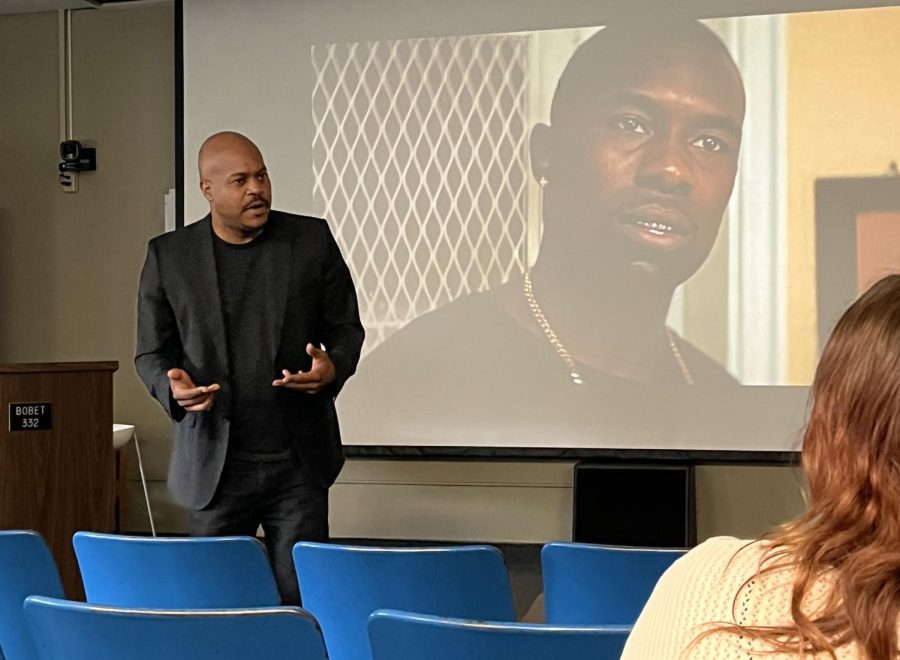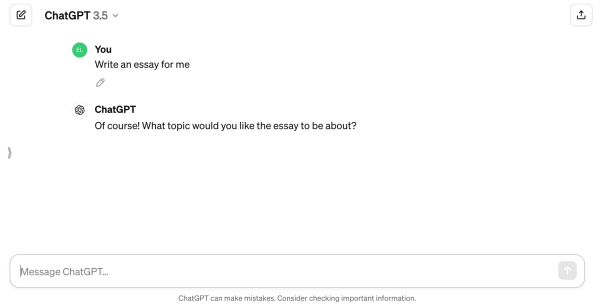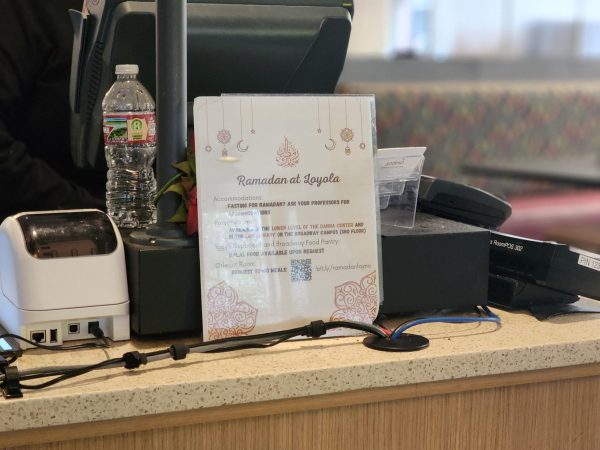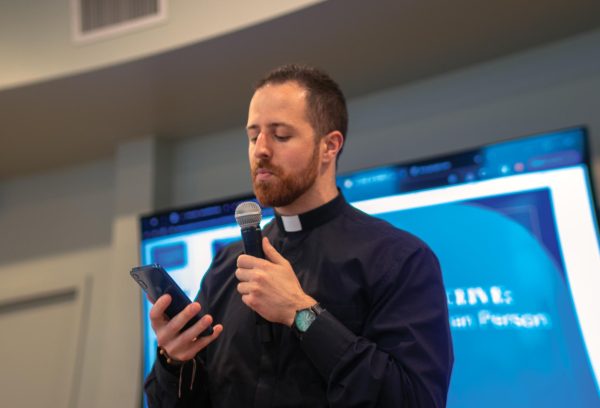Loyola’s only Black English professor says his dismissal feels targeted
Professor Heath teaches his Black Cinema course on May 2, 2023. Heath is the only Black English professor at Loyola.
May 4, 2023
As Loyola University’s only Black English professor continues to fight for reinstatement, many faculty and students are drawing attention to broader institutional issues, including a lack of diversity among professors and concerns regarding contract renewal policies.
Scott Heath, a tenure-track professor who is also the director of Loyola’s African and American studies program, said he was not provided with prior notice of a contract renewal vote.
Contracts for non-tenured faculty are reviewed on an annual basis, according to university spokeswoman Rachel Hoormann. Periodically, non-tenured, tenure-track professors are required to submit a letter similar to a job application for review.
Once that application is submitted, the department’s tenured professors must review it along with their performance and vote on whether or not their contract should be renewed.
Heath failed to meet the deadline to submit the application.
An emergency trip
Shortly before it was time for the English department to review his contract, which took place in October of last year, Heath’s lifelong best friend unexpectedly died. Heath said he remained in North Carolina for two weeks in September to take care of his best friend and make funeral arrangements.
As soon as he learned of his friend’s death, Heath said he called the English Department to inform them of the situation and emailed his students he would have to cancel class due to an emergency.
“Everybody knew where I was going,” he said. “And I know the English Department knew because they sent flowers to the funeral home.”
During his two-week emergency trip, Heath said he still remained engaged with his students and kept them updated on how long he would be there.
“I would email them and say, ‘alright y’all, I’m gonna be here longer than I thought, so read this so that we can stay on schedule.’ We’ve been taught to work remotely anyway,” Heath said. “I never actually took time off. I was still teaching my class.”
Heath said he was contacted by the chair of the English Department, Tim Welsh, asking if Heath would like an extension on the deadline to submit his application, which he was granted. Heath said he was given no specific deadline and did not know how long the extension was going to be.
But Heath said at some point, a vote on his contract renewal happened.
“I say at some point because I was not aware of this meeting; otherwise, I would have quickly put together my letter,” he said.
Heath said he presumed that the lack of materials available for the department to review led to an automatic decision not to renew his contract. Since then, Heath and two of the five professors who voted on his contract have been trying to reverse that decision.
The Maroon reached out to the English Department for comment regarding Heath’s situation, but Chair of the English Department, Tim Welsh, declined to issue any formal statement.
Three-fifths majority
Tenured English professors and co-directors of the Center for Editing and Publishing, Mark Yakich and Christopher Schaberg, were the only two professors who voted to renew Heath’s contract, according to Yakich and Schaberg.
But even as they were voting, Schaberg, who was a part of the committee involved in hiring Heath, said neither he, nor Heath, fully comprehended the severity of the situation at that time.
“It was a very confusing meeting,” Schaberg said. “But I don’t think anything he did warrants him losing his job.”
Schaberg expressed deep concerns with the meeting, noting that without Heath present and lacking any relevant documents to review, the situation was “deeply problematic” in his view.
“There have been so many junctures where we could have rerouted and stopped this,” Schaberg said.
Schaberg also recalled a portion of the meeting where Yakich asked them to imagine how it might feel to be a Black man surrounded by white colleagues — in a university and bureaucracy built by whites — and how that might affect one’s ability to ask for help.
“That’s a position none of us will ever know,” Yakich said.
Yakich said that this situation brought to light certain aspects of the university’s contract renewal process that have been previously overlooked.
“[Heath’s] case has put into question how university policies and procedures have failed a faculty member and how the system of ‘shared governance’ itself should change, particularly as tenured faculty numbers dwindle and the university relies on ‘contingent faculty,’” Yakich said.
Contingent faculty are faculty members who do not have the authority to vote on contract renewals or promotions.
Yakich said that Loyola has a responsibility to support its faculty and staff in the same way that it supports its students.
“Although I voted to renew Dr. Heath, I know that I failed him,” Yakich said as he recalled not reaching out to Heath when his friend died and later when his contract was being reviewed. “But I could also say that I was indolent, or that I assumed everything was okay, or that I thought the system would usher him along just fine. I was wrong.”
Heath said he felt like his dismissal was planned, and it seems like a few members of the English Department took the opportunity to remove him while he was at his most vulnerable.
Schaberg said that the decision not to renew Heath’s contract has caused division within the English Department.
The other tenured professors who were involved in the voting process, Hillary Eklund, Sarah Allison, and Tim Welsh, all declined to comment.
Students rally for Heath
Since the decision, Heath said he has gone through many hoops to try and keep his job, including what he described as a lengthy appeals process, which has not yet resulted in any progress.
Heath said the process has felt “isolating, alienating, humiliating, and stigmatizing.”
After weeks of waiting around and hearing nothing, Heath said he felt like he was buying into a “culture of silence.”
“When students began to ask about next year, I realized that it would be unfair of me, and even unprofessional of me, to just secretly disappear from Loyola without students knowing what was going on,” Heath said.
So, Heath said he decided to email any of his students who he was close to as a mentor, instructor, or advisor to explain his situation.
Shortly after his email was sent out, Heath’s students, Crow Carson and Camilla Johnson, began to make other students aware of the situation. Carson, an English major, was one of the students who asked Heath if he was leaving because his courses weren’t on the catalog for next semester.
“He is my favorite professor in the English Department. He’s made such a great impact on me,” Carson said. “He’s really filled a void of knowledge that I’ve always wanted and needed.”
Similarly, Johnson said that Heath has played a crucial role in expanding her knowledge and understanding of her own culture.
“His classes have been highly informative and transformative in my way of thinking and the ways that Black people navigate existing in this world,” she said. “Without his classes, I just would be less well-rounded.”
Carson and Johnson reached out to the president of Loyola’s chapter of the Young Democratic Socialists of America, Carson Cruse. They informed him of what was happening and asked if they could help.
Cruse said that the chapter recently held a demonstration protesting House Bill 999 that passed in Florida that would ban, among other things, African and African American studies.
“Bills like it are already being created in Louisiana, so seeing Loyola fire an indispensable member of the program was quite alarming,” Cruse said.
Cruse said that he, Johnson, and Carson wrote a letter to the university, demanding that Heath be reinstated. He said that the Loyola chapters of Young Democratic Socialist of America and the National Association for the Advancement of Colored People published the letter in a joint Instagram post that got over 1,600 likes and over 600 signatures on the letter between a Google Form and chapter tabling.
Cruse said when the university did not respond to this letter, it sparked the protest that took place last week. The two Loyola chapters and many of Heath’s students participated in the demonstration that advocated for Heath’s position at Loyola.
Following the protest and a conversation between a few students and Interim President, the Rev. Justin Daffron S.J, Daffron sent out an email stating that he couldn’t reveal certain details about Heath’s case but the appeal is currently being reviewed by him.
Diversity, Equity, and Inclusion
Like Cruse, many students have expressed that not only are they upset that one of their favorite professors is being let go, but that the African and American studies program would go along with him.
“The university can say whatever they want, but his dismissal is part and parcel of a larger war on Black studies and DEI departments nationwide,” said Turner Wolffe, a history major currently enrolled in Heath’s Black American Film course. “His firing is disgusting and demonstrates that the administration sees diversity as a trophy and, to quote Dr. Heath, ‘black faculty as disposable — replaceable.’”
Sociology junior Malaika Saleem said that the reason Heath’s dismissal has struck such a chord with students is because of “his ability to connect with students, his excellence as a professor, and his being the only Black professor in the English department.”
“This is unacceptable and deeply unsettling,” Saleem said.
Many students, like Johnson and Carson, have shared their learning experiences with Heath.
“For what my experience as an English Literature major is worth, Dr. Heath seems to me nothing short of an exemplar for English professors as a whole,” said student Lawrence Bourgeois, who has had Heath as a professor for three semesters. “Dr. Heath is one of the professors I most fervently wish for our university to retain.”
Heath said that though he feels beaten down, he is humbled and honored by the students for speaking out for what they want in a Jesuit education.
“Not only do they care about my situation, but they care about their situation,” he said. “They are taking the institution to task for what it says about diversity.”
Heath’s dismissal, according to Saleem, makes it much more likely that a Loyola student could spend an entire four years and graduate from the university without ever having a Black professor.
“This fight is about Dr. Heath, but I’m also thankful that the reaction from the community and beyond has illuminated the broader issue of the scarcity of Black professors–and others with marginalized identities — in academia.”
Heath said that in his short time at Loyola, he has already seen several Black professors depart, and knows two who have said they are leaving after this school semester.
“What’s happening to me is indicative of what’s happening and what happens to a lot of Black faculty,” he said. “And sadly, it’s indicative of what’s happening to Black studies across the country.”



















